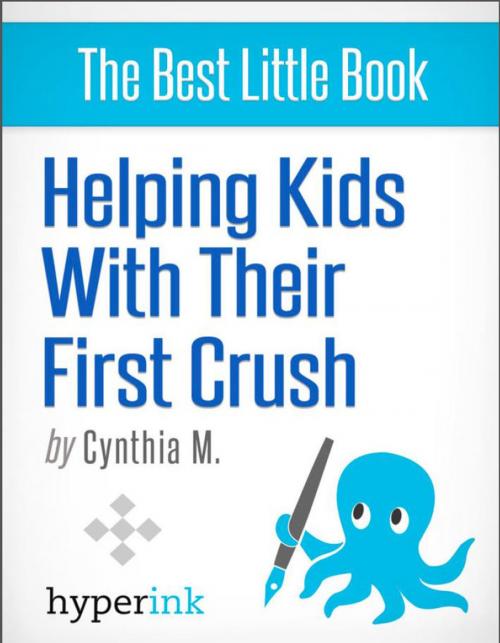Your Child's First Crush - What It Means and How To Talk About It
Nonfiction, Reference & Language, Reference, Guides & Handbooks| Author: | Cynthia Malu | ISBN: | 9781614648215 |
| Publisher: | Hyperink | Publication: | March 4, 2012 |
| Imprint: | Hyperink | Language: | English |
| Author: | Cynthia Malu |
| ISBN: | 9781614648215 |
| Publisher: | Hyperink |
| Publication: | March 4, 2012 |
| Imprint: | Hyperink |
| Language: | English |
ABOUT THE BOOK
From the giggly four-year old who proclaims that he wants to marry his teacher to the pre-teen who gushes over the cute boy who sits next to her in class, your child's first crush is a new frontier, and its best to prepare yourself long before it happens. As a parent, you can take an active part in helping your child navigate his or her romantic feelings. To be a positive part of your childs first experience with puppy love, the most important thing you can do is help your child feel comfortable communicating with you.
A crush is no more than an infatuation. Unlike a true romantic relationship, when two individuals acknowledge their deep feelings for one another, a crush is often a one-sided attraction. When children have a crush, they are not focused on loving the object of their affection as an entire person, flaws and all. Instead, they build up a fantasy of sorts in their minds, and spend time daydreaming about what it would be like to be together.
EXCERPT FROM THE BOOK
Try to find out how your childs crush is responding to him. Ask him if his crush talks to him at school. This will help you gauge the level of intensity and the direction things are headed. If his crush returns his feelings, he may be on the verge of a relationship. While you wont be able to change the eventual outcome of your sons crush, you can guide him as he navigates the unfamiliar waters of romantic feelings.
The way you approach the subject will depend on your childs age. For a young child, be positive but truthful when you talk about the crush. Explain that it's normal to have strong feelings for people when you like their looks and behavior, but make sure your child knows that it's not necessary to act on those feelings. Guide him or her in making appropriate decisions. For instance, if your daughter wants to give a gift to a boy she likes on Valentine's Day, help her choose something that won't be overwhelming for either party.
If the object of your young child's affection is an adult, don't be overly concerned. According to Dr. Laura Rocker, a pediatric physician, children often experience their first crush on a celebrity or an adult they find attractive. This behavior is normal, and as a child grows older, he or she will become interested in peers his or her own age...
Buy a copy to keep reading!
CHAPTER OUTLINE
Helping Kids With Their First Crush
+ Introduction
+ How to Get Involved as a Parent
+ Avoiding Common Mistakes
+ Tips on Staying Connected With Your Child
+ ...and much more
ABOUT THE BOOK
From the giggly four-year old who proclaims that he wants to marry his teacher to the pre-teen who gushes over the cute boy who sits next to her in class, your child's first crush is a new frontier, and its best to prepare yourself long before it happens. As a parent, you can take an active part in helping your child navigate his or her romantic feelings. To be a positive part of your childs first experience with puppy love, the most important thing you can do is help your child feel comfortable communicating with you.
A crush is no more than an infatuation. Unlike a true romantic relationship, when two individuals acknowledge their deep feelings for one another, a crush is often a one-sided attraction. When children have a crush, they are not focused on loving the object of their affection as an entire person, flaws and all. Instead, they build up a fantasy of sorts in their minds, and spend time daydreaming about what it would be like to be together.
EXCERPT FROM THE BOOK
Try to find out how your childs crush is responding to him. Ask him if his crush talks to him at school. This will help you gauge the level of intensity and the direction things are headed. If his crush returns his feelings, he may be on the verge of a relationship. While you wont be able to change the eventual outcome of your sons crush, you can guide him as he navigates the unfamiliar waters of romantic feelings.
The way you approach the subject will depend on your childs age. For a young child, be positive but truthful when you talk about the crush. Explain that it's normal to have strong feelings for people when you like their looks and behavior, but make sure your child knows that it's not necessary to act on those feelings. Guide him or her in making appropriate decisions. For instance, if your daughter wants to give a gift to a boy she likes on Valentine's Day, help her choose something that won't be overwhelming for either party.
If the object of your young child's affection is an adult, don't be overly concerned. According to Dr. Laura Rocker, a pediatric physician, children often experience their first crush on a celebrity or an adult they find attractive. This behavior is normal, and as a child grows older, he or she will become interested in peers his or her own age...
Buy a copy to keep reading!
CHAPTER OUTLINE
Helping Kids With Their First Crush
+ Introduction
+ How to Get Involved as a Parent
+ Avoiding Common Mistakes
+ Tips on Staying Connected With Your Child
+ ...and much more















